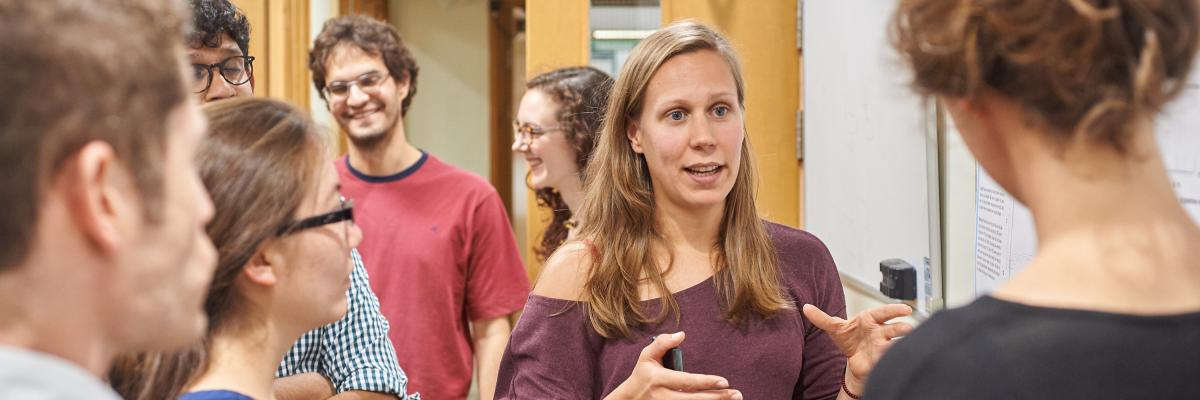Introduction to our PhD Programme
Understanding how neuronal activity supports brain function and redressing aberrant dynamics when the brain goes awry in diseases requires a trans-disciplinary and cross-species approach, integrating experimental and clinical investigations with engineering and computational frameworks. Our PhD programme at the Medical Research Council Brain Network Dynamics Unit (MRC BNDU) trains a future generation of neuroscientists to combine these diverse techniques in innovative research projects serving both foundational, theoretical and translational neuroscience. Ours is a vibrant community of scientists and students drawn from around the world.
PhD students at the MRC BNDU can choose among diverse yet complementary research projects that leverage from a substantial array of research techniques. They benefit from the guidance of two supervisors and the feedback from the outstanding research community, locally in the Unit and in the wider intellectual environment of the University of Oxford. Students also have opportunities to further their knowledge and skills through seminars, including our Unit “Methods meetings” and practical tutorials.
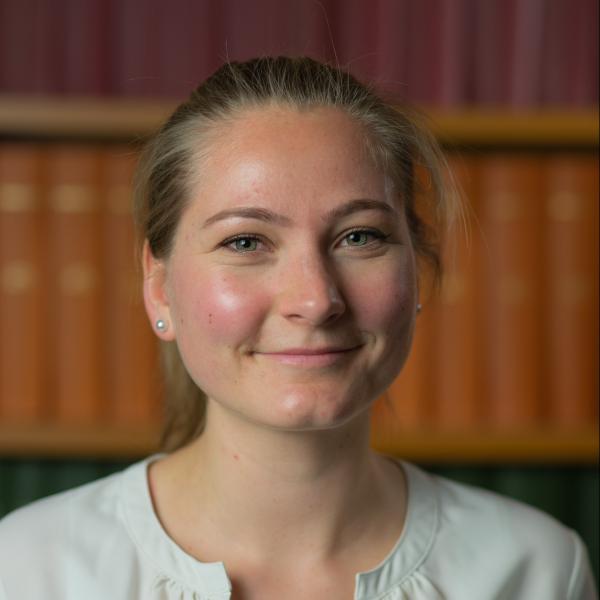
Techniques
Students apply for one or more of the research projects made available each year. Projects involve the intensive use of a focussed set of trans-disciplinary methods but students also become familiar with the full range of approaches taken within the Unit. These include:
- Behavioural experiment paradigms with rodents and humans
- Advanced signals analysis, including statistical analytical techniques, mathematical modelling and machine learning.
- Cell type-specific monitoring including electron microscopy, optogenetics and fast-scan cyclic voltammetry.
- Computational modelling.
- System and cell type specific brain stimulation using closed-loop approaches and magnetic, electrical, pharmacological and optogenetic stimulation.
In addition, to the above we actively develop novel research tools for neuroscience discovery, and better disease treatments.
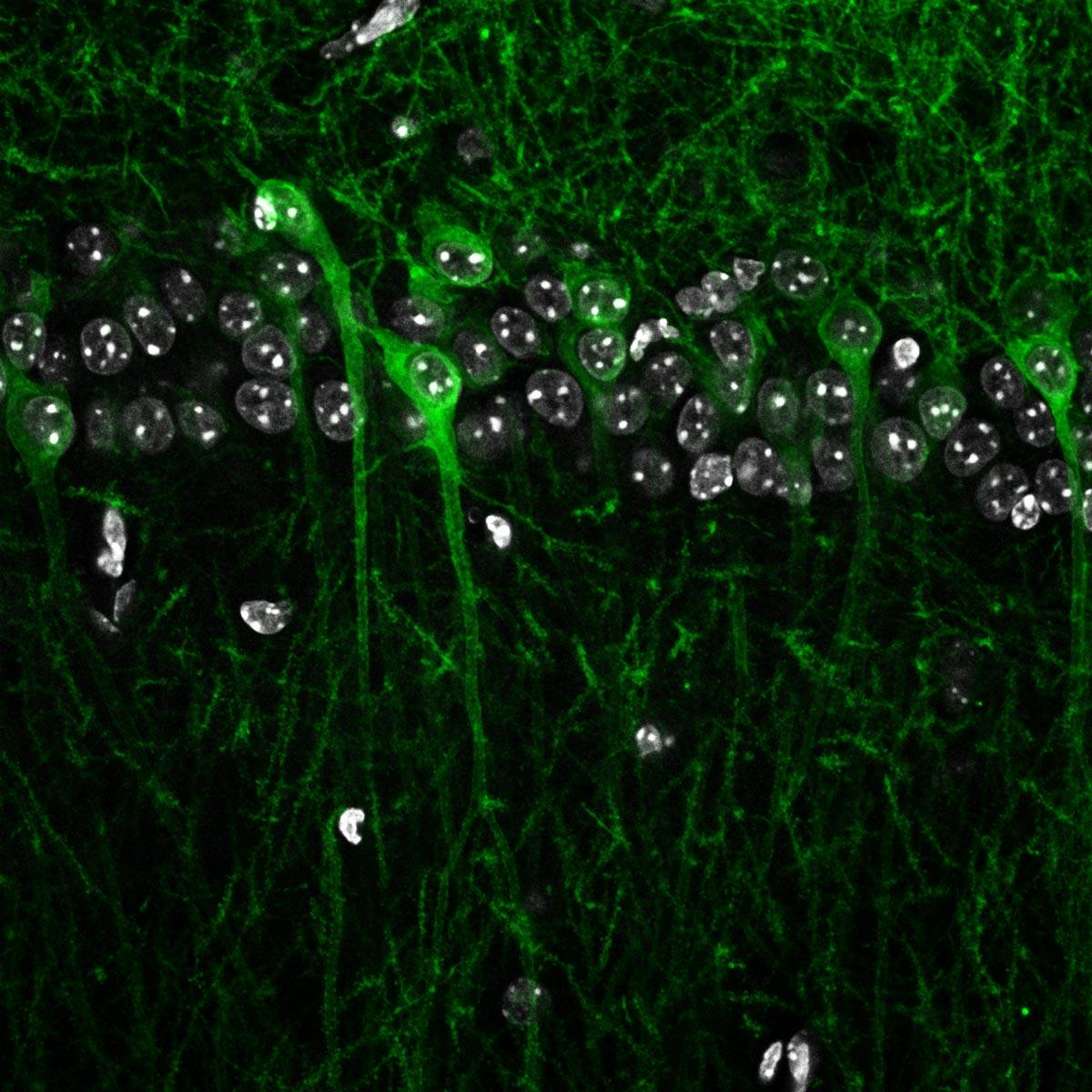
ArchT-GFP–expressing neurons in the pyramidal cell layer of mouse hippocampus. From: Recoding a cocaine-place memory engram to a neutral engram in the hippocampus. Trouche S. et al. Nat Neurosci. 2016 Apr;19(4):564-7.
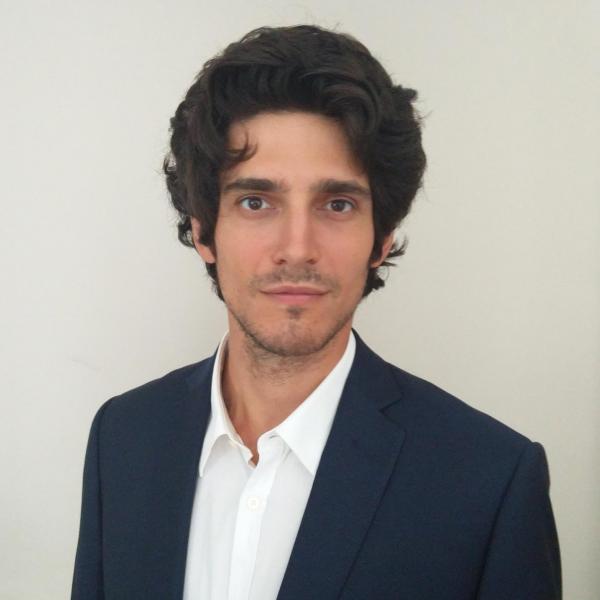
The Unit has provided three key ingredients to kickstart my scientific career: a constant source of inspiration, the freedom to explore my ideas, and frequent opportunities for feedback.”
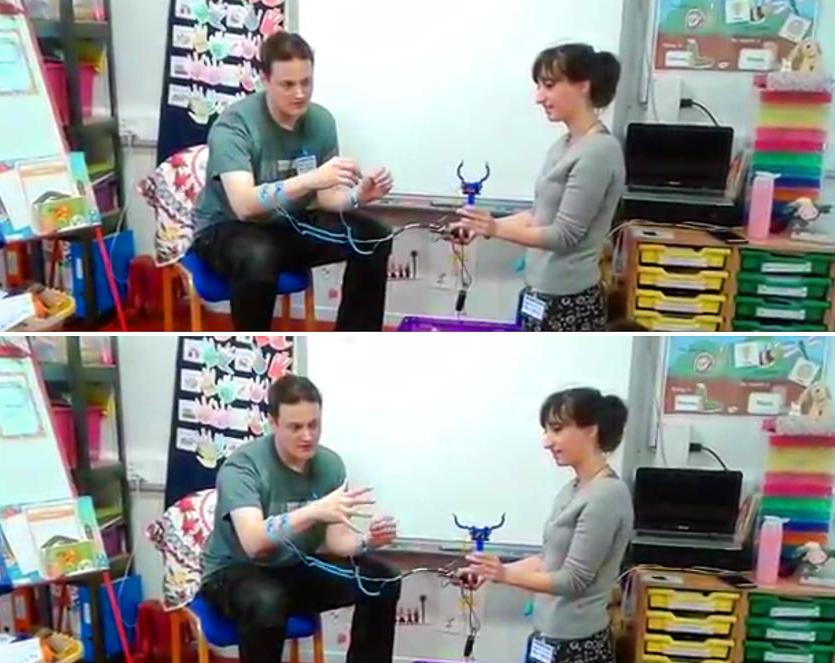
Ben and Flavie demonstrate how electricity in the muscles of the arm can be detected and used to control a robot claw, during a presentation to primary school children.
Career Development
Career Development is central to the Unit’s ethos. Every student at the Unit benefits from all the resources the MRC BNDU offers, as well as those offered by our host department, Nuffield Department of Clinical Neurosciences, the Medical Sciences Division, and the student’s own college. Within the MRC BNDU the Training, Career Development and Capacity Building Strategy Committee meets regularly to oversee training for our students and early career post-docs. Regular events in the Unit include the biannual science day, which offers a chance for the whole unit to come together and share new and exciting results in a collegiate atmosphere. We run an annual training day which is open to all and focusses on different aspects of career development for academic and non-academic careers. Recent sessions have included developing a patient and public involvement strategy, combining a career with caring responsibilities and a workshop on delivering grant pitches. Previous students at the Unit have all gone on to careers in Academia, Medicine, or Industry.
Previous students who completed their PhD in the Unit have gone on to successful careers in a wide range of job roles. The challenging yet rewarding research in the Unit is a great start to your career and I would definitely recommend working here!”
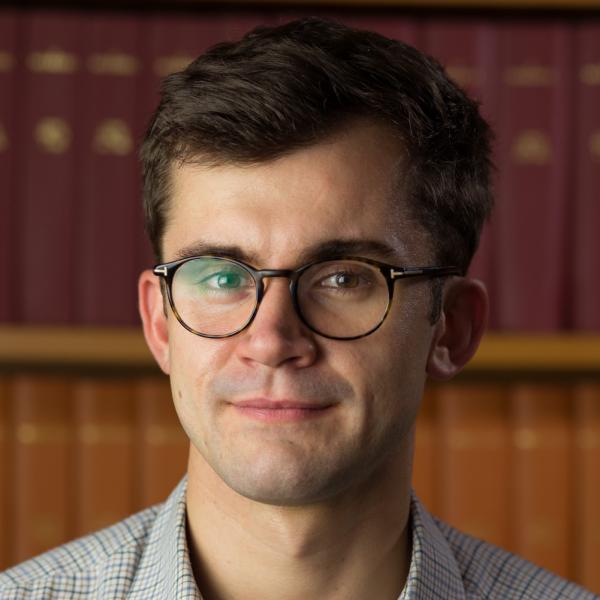
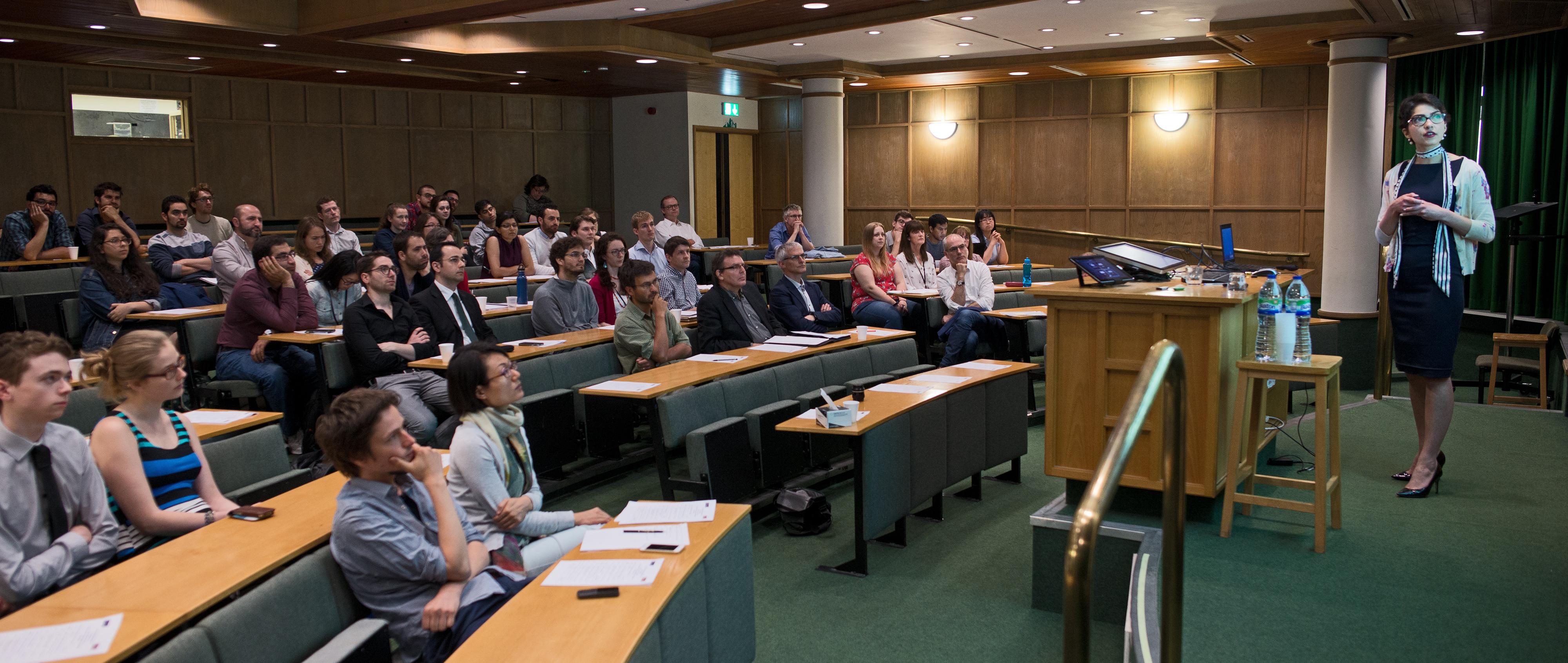

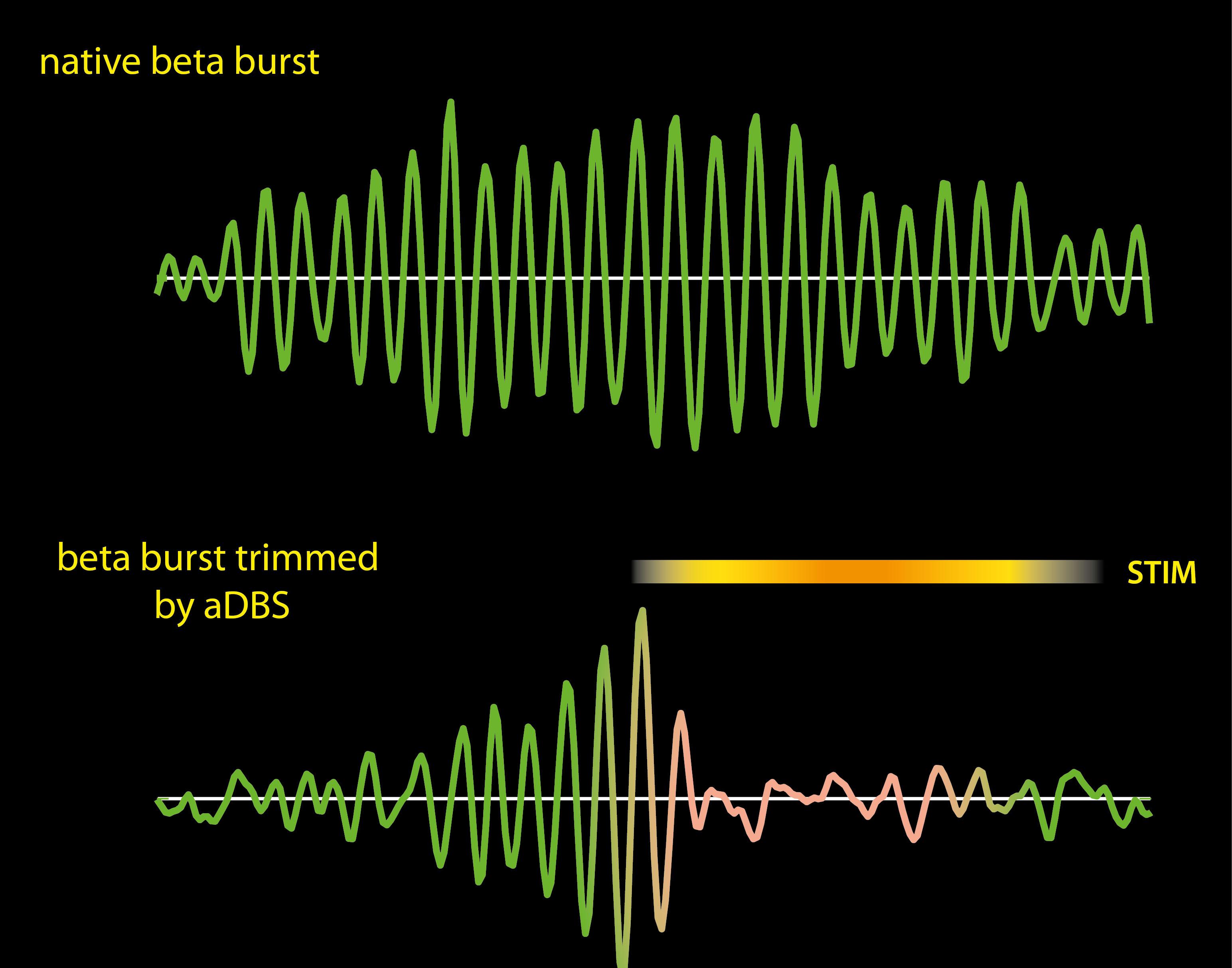
Local field potential signal recorded from a patient with a deep brain stimulation electrode, showing a burst of beta-frequency oscillatory activity (top) and adaptive deep brain stimulation being triggered and reducing the length of another beta burst (bottom).
Applications & Funding
Applications & Funding
The MRC BNDU has its own MRC-funded Ph.D. (D.Phil.) studentships. Applicants to these MRC-funded studentships can also be considered for University scholarships. The Unit will also consider hosting PhD students funded by Departmental scholarships and other doctoral training programmes at Oxford. In addition, the Unit sometimes recruits for iCASE studentships in collaboration with industry. Information about University funding is available and an A-Z of Oxford scholarships. Students with their own independent funding will also be considered.
The MRC BNDU is one of the six divisions of the Nuffield Department of Clinical Neurosciences, and as such we benefit from the excellent student services and streamlined application process provided by the Department. The Nuffield Department of Clinical Neurosciences provides general information for prospective students, advice on entry requirements, and information about potential costs. There is also specific advice for prospective Home and International students.
Students considering applying for one or more of the PhD studentship projects available in the MRC BNDU should first contact the supervisor(s) named in the project description using the email provided in the project summary. You are encouraged to contact the supervisor(s) as soon as possible to find out more about the project and the application process. We look forward to hearing from you.
To be considered for a MRC-funded studentship following contact with the supervisor(s) of your proposed project, please submit an application following the online guidance for the D.Phil. in Clinical Neurosciences. On the application form, in the section headed ‘Departmental Studentship Applications’, you must indicate that you are applying for a studentship and enter the reference code for a MRC BNDU studentship.
In the special instance of an iCASE studentship, please contact the named supervisor(s) directly for advice on the application process.
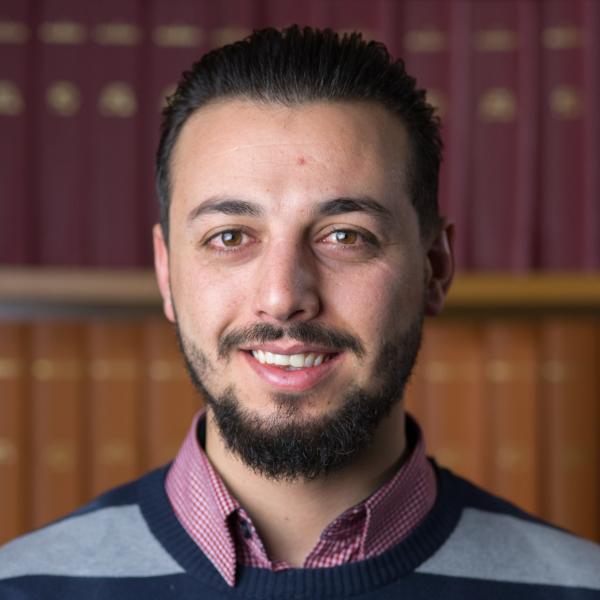



Hippocampal theta oscillations (white) with associated faster rhythms (rainbow colours). From: Lopes-Dos-Santos V. et eal. Parsing Hippocampal Theta Oscillations by Nested Spectral Components during Spatial Exploration and Memory-Guided Behavior. 2018. Neuron, 100(4):940–952.
